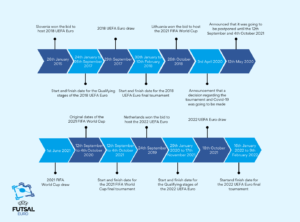2022 UEFA Futsal Euro Preview (Part 2)
Over a century ago, Uruguayan Juan Carlos Ceriani, hand-picked the rules from a range of different sports and created what we call Futsal today.
Team sizes and matches duration from Basketball, the court size, boundaries and goal dimensions from Handball and the goalkeeper rules from Water Polo.
In 1965, the first international confederation was formed consisting of the following nations. Uruguay, Paraguay, Peru, Argentina and Brazil. The name of the sport derives from the Spanish words Fútbol (football) and Sala (hall). In Brazil both are used equally, Futsal and “Futebol de Salão”.
The journey in European Futsal tournaments started in the 1990s and since then we have had four countries win the title. Italy, Russia, Portugal and Spain, who undoubtably have been the dominant nations in this competition.
Futsal had existed since the 1930s, but its introduction by FIFA only came in the 1980s. Brazil became winners of the first edition of the FIFA Futsal World Cup in January 1989. Since then, it has become a rapidly growing sport and its’ popularity around the world grew.
In Europe this growth was reflected by the creation of the UEFA European Futsal Championship, the first to be granted championship status as full-scale. This came after an experimental tournament hosted and won by Spain. There have been nine tournaments hosted in a two-year-cycle (excluding 2007-2010)
The first five tournaments (1999, 2001, 2003, 2005 and 2007) consisted of eight teams and the following five tournaments (2010, 2012, 2014, 2016 and 2018) consisted of 12 teams.
For the 2022 edition, 50 of UEFA’s associations entered the competition, most of whom would not have heard about Futsal when the championships first started.
In 2019 the first Women’s and under-19 UEFA Futsal Euro were held which is a testament to the development of the sport. In many parts of the world, it is an exciting, arena filling and full-fledged professional sports. Structured leagues, broadcasting deals, professional referees.
2022 is the first time four UEFA Futsal titles are going to be decided in the same year. UEFA Futsal Euro, UEFA Women’s Futsal Euro, UEFA Futsal Champions League and UEFA Futsal Under 19 Euro.
Previous Winners
1996 – Spain (Spain 5-3 Russia – Córdoba, Spain)
1999 – Russia (Russia 3-3 Spain aet 4-3 – Granada, Spain)
2001 – Spain (Spain 2-1 Ukraine golden goal – Moscow, Russia)
2003 – Italy (Italy 1-0 Ukraine – Caserta, Italy)
2005 – Spain (Spain 2-1 Russia – Ostrava, Czech Republic)
2007 – Spain (Spain 3-1 Italy – Porto, Portugal)
2010 – Spain (Spain 4-2 Portugal – Debrecen, Hungary)
2012 – Spain (Spain 3-1 added extra time – Zagreb, Croatia)
2014 – Italy (Italy 3-1 Russia – Antwerp, Belgium)
2016 – Spain (Spain 7-3 Russia – Belgrade, Serbia)
2018 – Portugal (Spain 3-2 Spain added extra time – Ljubljana, Slovenia)
Total Titles
Spain – 7
Italy – 2
Russia – 1
Portugal – 1
https://twitter.com/UEFAFutsal/status/1482638768758837255
2022 Qualifying Stage
This qualifying process was the first time it held a home-and-away format. It consisted of eight groups where the winner of each group would qualify automatically and they would be joined by the best six runners up, all along-side hosts Netherlands. The two remaining runners up, would battle it out for the last spot in a play-off.
Some of these qualifying numbers include: 49 teams, 4 rounds, 152 matches, 899 goals, 5.91 average goal per match, 6 minutes and 46 seconds per goal.
Overall top-goal scorer with 10 goals in eight games, Germans Matjusenko from Latvia. From the finalists teams, Archil Sebiskveradze with nine goals in seven games. Roninho served his team mates 11 times.
In group 1, Croatia and Ukraine qualified leaving Denmark and Albania behind. Croatia guaranteed their spot into the final tournament convincingly, taking home 18 points from 6 matches with a 22 goals difference.
In group 2, Russia and Georgia advanced leaving France and Armenia empty handed. It was a similar story to group 1 as Russia also held a perfect record with a 26 goals difference.
In group 3 Azerbaijan and Slovakia were too much for Moldova and Greece. Azerbaijan didn’t produce the same record as the two previous groups but went through unbeaten with 16 points from 18 available.
In group 4, Bosnia and Herzegovina and Serbia qualified. Bosnia achieved success automatically, but Serbia had to beat Belarus in the play-off to guarantee a spot in the final tournament. Bosnia was one out of the only two group winners to lose a game.
In group 5, Kazakhstan qualified. The remaining three teams didn’t. Hungary and Israel fell in the group stage and Belarus lost the play-off match against Serbia. Kazakhstan looked dominant holding a 100% record and the second highest goal difference with 25 goals.
In group 6, giants Spain and Slovenia were successful in qualifying leaving Latvia and Switzerland at home. As expected, Spain dominated the group, boasting a perfect record of six matches and six wins with an astounding 43 goals for goals difference. Switzerland were one out of two countries to not register any points.
In group 7, Italy and Finland qualified leaving Belgium and Montenegro behind. This was one of the most competitive groups, Italy were the other group winners to lose a match.
In group 8, Portugal and Poland proceed to guarantee a spot in the final tournament unlike Czech Republic and Norway. Portugal went through unbeaten with 4 wins and 2 draws. Norway did not register a point.
Timeline of events since Euro 2018

The sport remains rapidly growing and the progress that has been made until now tracks way back further than 2018. Netherlands opportunity to showcase how far its come.
To be continued…